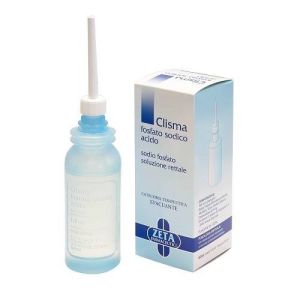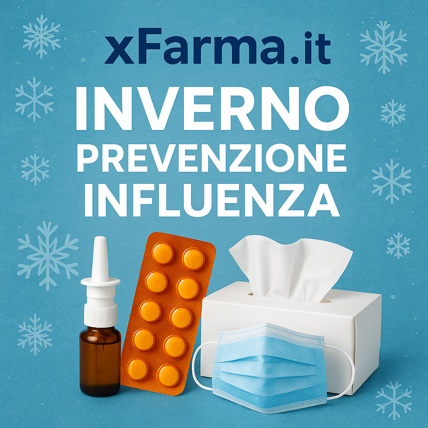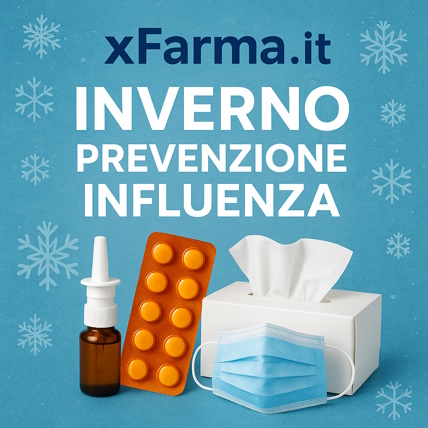Ship in Europe, Find out rates!
Sodium Zeta Phosphate Pharmaceuticals 1 Bottle Soluz Rett 120 M

- box Delivery in Italy in 24/48 and free returns
- star3.000+ positive reviews
- dropboxOver 60,000 products in the catalog
Therapeutic indications
- Treatment of constipation. - Clinical conditions that require pre and post-operative intestinal emptying, in preparation for radiological examinations and endoscopic investigations of the last intestinal tract.
Dosage
Adults and adolescents (12 - 18 years) : 1 bottle of 120 ml. Do not use more than one bottle per day. Each bottle is to be used for one administration only; any remaining medicine must be discarded. Administration can be practiced at room temperature. If you prefer lukewarm, just put the bottle in contact with hot water (by immersion or under the tap). For a better effect it is advisable to practice the administration in a lying position on the left side. For a greater cleaning action, assume the genupectoral position for a few minutes, immediately after administration. Instructions for use Before using the medicine push the cannula cover down until the safety seal of the bottle breaks. 1. Remove the protective cap from the rectal cannula. 2. Grasp the bottle and gently introduce the cannula into the rectum, then squeeze the bottle thoroughly. A residue of solution is expected to remain in the bottle. 3. After dosing, remove the cannula and discard the empty bottle in its own box according to the drug disposal rules. 4. Remain lying down until an urgent need to evacuate, which usually occurs within 5 minutes. In any case it is not necessary to withhold the enema beyond 10-15 minutes.
Overdose
The most frequently observed effect following ingestion or rectal administration is gastrointestinal irritation (abdominal pain, nausea, vomiting, diarrhea). Persistent diarrhea results in loss of water, mineral salts (especially potassium) and other essential nutritional factors. Leaking fluids and electrolytes must be replaced. Electrolyte imbalances are characterized by the following symptoms: thirst, vomiting, weakness, edema, bone pain (osteomalacia) and hypoalbuminemia. In the most severe cases, dehydration or hypokalaemia may develop, which can lead to cardiac or neuromuscular dysfunctions, especially in the case of simultaneous treatment with cardiac glycosides, diuretics or corticosteroids. Leaking fluids and electrolytes must be replaced. Conservative measures are generally sufficient; you should be given plenty of fluids, especially fruit juices. See also what is reported in section 4.4 about laxative abuse. Hyperphosphataemia, hypocalcemia, and hypomagnesaemia may occur if a significant amount of phosphate is absorbed. Alterations in water and electrolyte balance have been observed following oral, rectal and intravenous exposure. Severe hyperphosphataemia and hypocalcemia can cause tetany, seizures, bradycardia, QT prolongation, arrhythmia, coma and cardiac arrest. Severe dehydration, hypernatremia, hypotension, metabolic acidosis and tachycardia can also occur. The elderly, children and patients with renal insufficiency are at increased risk of toxic effects.
Contraindications
- Hypersensitivity to the active substance or to any of the excipients listed in section 6.1. - acute abdominal pain or of unknown origin, - nausea or vomiting, - intestinal obstruction or stricture or anorectal stenosis; - intestinal sub-occlusion, - mechanical ileus, - paralytic ileus, - inflammatory intestinal disorders and other conditions that may increase drug absorption, - anal perforation, - congenital or acquired megacolon, - Hirschsprung's disease, - rectal bleeding of origin unknown, - acute haemorrhoidal crisis with pain and bleeding, - severe dehydration, - children under the age of twelve. Phosphates are contraindicated in patients with heart disease, severe renal insufficiency or in the presence of hyperphosphatemia. Other preparations with sodium phosphates, including oral solutions or sodium phosphate tablets, should not be administered concurrently (see section 4.5).
Side effects
The following are sodium phosphate side effects organized according to the MedDRA system organ class. Insufficient data are available to establish the frequency of the individual effects listed. Immune system disorders Hypersensitivity reactions (e.g. urticaria) Skin and subcutaneous tissue disorders Blistering, itching, burning Gastrointestinal disorders Isolated cramping or abdominal colic and diarrhea, with loss of fluids and electrolytes, more frequent in cases of severe constipation, as well as rectal irritation. Nausea, vomiting. Metabolism and nutrition disorders Hyperphosphataemia, hypokalaemia, hypernatremia, hypocalcemia and tissue calcification may rarely occur. Reporting of suspected adverse reactions Reporting suspected adverse reactions that occur after authorization of the medicinal product is important, as it allows continuous monitoring of the benefit / risk ratio of the medicinal product. Healthcare professionals are asked to report any suspected adverse reactions via the national reporting system at www.agenziafarmaco.gov.it/it/responsabili.
Pregnancy and breastfeeding
There have been no adequate and well-controlled studies on the use of the medicine during pregnancy or breastfeeding. Although there are no obvious contraindications to the use of the medicine during pregnancy and breastfeeding, it is recommended to take the medicine only in case of need and under medical supervision.
Special warnings
Pediatric population The 120 ml bottle is not for use in children under 12 years of age. The abuse of laxatives (frequent or prolonged use or with excessive doses) can cause persistent diarrhea with consequent loss of water, mineral salts (especially potassium) and other essential nutritional factors. In the most severe cases, dehydration or hypokalaemia may develop, which can lead to cardiac or neuromuscular dysfunctions, especially in the case of simultaneous treatment with cardiac glycosides, diuretics or corticosteroids. Patients should be encouraged to drink fluids to help prevent dehydration, particularly patients with conditions that may predispose them to dehydration, or those taking medications that can decrease glomerular filtration rate, such as diuretics, enzyme inhibitors converting angiotensin (ACE inhibitors), angiotensin receptor blockers (sartans) or non-steroidal anti-inflammatory drugs (NSAIDs). Since Sodium Phosphate Zeta contains sodium phosphates, there is a risk of elevated serum sodium and phosphate levels and decreased calcium and potassium levels, and consequently hypernatremia, hyperphosphataemia, hypocalcaemia and hypokalaemia, which may occur with clinical signs such as tetany and renal failure. The abuse of laxatives can cause addiction (and, therefore, the possible need to gradually increase the dosage), chronic constipation and loss of normal intestinal functions (intestinal atony). Repeated use of laxatives can give rise to addiction or damage of various kinds. Prolonged use of a laxative for the treatment of constipation is not recommended. The pharmacological treatment of constipation must be considered an adjuvant to the hygienic-dietetic treatment (eg increase of vegetable fibers and fluids in the diet, physical activity and re-education of intestinal motility). The treatment of chronic or recurrent constipation always requires the intervention of the doctor for the diagnosis, the prescription of drugs and the surveillance during the course of therapy. A careful evaluation by the doctor is essential when the need for the laxative derives from a sudden change in previous bowel habits (frequency and characteristics of bowel movements) that lasted for more than two weeks or when the use of the laxative fails to produce effects. Elderly people or those in poor health and patients with uncontrolled arterial hypertension, ascites, heart disease, changes in the rectal mucosa (ulcers, cracks) should consult their doctor before using the medicine. Patients should be advised to discontinue administration if resistance is encountered, as forceful administration of the enema may cause injury. In episodes of constipation, it is advisable first of all to correct eating habits by integrating the daily diet with an adequate intake of fiber and water. When using laxatives it is advisable to drink at least 6-8 glasses of water or other liquids per day to help soften the stool. Important information about some of the ingredients Sodium phosphate Zeta 16% / 6% rectal solution contains : - Bronopol which can cause local skin reactions (eg contact dermatitis);
Expiry and Retention
Keep this medicine tightly closed in the original package in order to protect it from light.
Active principles
100 ml of solution contain: active ingredients: Monobasic sodium phosphate dihydrate 18.088 g equal to monobasic sodium phosphate monohydrate 16 g dibasic sodium phosphate dodecahydrate 8.016 g equal to dibasic sodium phosphate heptahydrate 6 g Excipient with known effects: bronopol. For the full list of excipients see section 6.1.
Excipients
Purified water, bronopol.
| Destination | Cost | Detail |
|---|---|---|
| Italy | €5,00* | 72H |
| Austria, France, Germany, Slovenia | € 13* | 3 days |
| Belgium, Luxembourg, Portugal, Netherlands, Spain | € 14* | 4 days |
| Bulgary, Cechia, Hungary, Poland, Romania, Slovakia | € 19* | 5 days |
| Denmark, Estonia, Finland, Ireland, Lithuania, Latvia ,Sweden | € 22* | 5 days |
| United Kingdom, Switzerland, Greece, Malta/td> | € 30* | 7 days |
| Canada | € 40 | 7 Days |
European shipments with express courier: FedEx, MBE, DHL
*For the shipment outside band B ther's an extra cost of 22€ *For the shipment outside band C ther's an extra cost of 30€ Delivery Times exclude Saturday and Holidays
For Islands and Areas of difficult Accessibility the shipments are made in 72 hours and the cost will be increased by 15€

